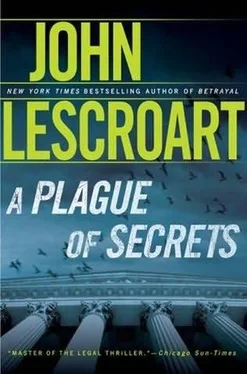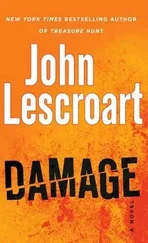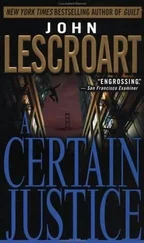Hardy could listen to Drysdale’s commentary all day, but he wasn’t even slightly amused. “This isn’t right, Art.”
Drysdale laughed with some enthusiasm. “We’ve barely started, Diz, and if you can’t laugh at it, you’re in deep shit.”
Hardy sat back. “What else?”
“You really want to know?” At Hardy’s nod Drysdale settled himself on the desk. “Jerry’s got so many ways he can play this, it’s just gorgeous. You said Kathy West may be involved here, right? And Harlen? Okay, first, he has them talk to one of our agents a few times. They’re not targets, he tells them. He wants them to roll over on your client, but they’re not themselves part of the investigation. So what’s that get him? Well, first, if either of them tells even a little fib to the federal agent, they are in felony land. And guess what? Federal agents don’t have to tape-record interviews.”
“Now you’re kidding me!”
“Would that I were, my son, but that was J. Edgar’s original policy and it’s in force today, so it’s always your word against that of a federal agent, and guess who the grand jury is more likely to believe? They’ve even got a cute little name for this cute little strategy-the Perjury Trap. Isn’t that special?”
“Beautiful. And I’m guessing we’re still not done yet.”
“You catch on fast, Batman. You really want to know?”
“I want to know where they teach this stuff. I’ve been a lawyer for thirty years and I’ve never run across it.”
“That’s not a coincidence, Diz, I promise. This is some très arcane shit. But anyway, since you asked, let’s say your people-Kathy and Harlen and even your client-avoid lying to their friendly federal agent. Now they go in front of the grand jury as individuals, where, you remember, they are specifically not targets. Glass gives them immunity for anything they say, and what’s interesting about that? Now they can’t take the Fifth! Now they’ve got to answer every single thing Glass asks them; if they refuse, they go to jail for contempt. Is that great, or what?”
“Why is that somehow familiar?” Hardy asked.
“Because you, as a lawyer, will remember that this is almost exactly what happened to Susan McDougal in Ken Starr’s Whitewater investigation. The grand jury called her up and even gave her immunity, but she refused to answer questions because she was concerned her statements would be viewed as false-”
“There’s a nice distinction,” Hardy commented. “Viewed as.”
“Isn’t it? Well, anyway, if they were viewed as false, then she’d be indicted for perjury, so she didn’t answer, and so for her troubles she got slammed with civil contempt, where you stay in custody as long as you refuse to answer or until the grand jury term expires, which in McDougal’s case was eighteeen months.”
“Holy shit.” Hardy rocked gently, his hands gripping the armrests, taking it all in. “So it’s way more than just this forfeiture stuff? What’s Glass going for? Money laundering?”
“At least. Plus distribution, conspiracy, you name it-where you’re looking at major hard time.”
“Jesus.”
Drysdale wasn’t smiling anymore either. “And I’m afraid it just gets worse, Diz.”
“I can’t really imagine how.”
“No. You probably can’t. So let me tell you the real ugly truth. You should know for your client’s sake, and Kathy and Harlen’s, too, for that matter, that you want to do everything you can to keep them from getting charged at all. That’s what Jerry wants-he wants to force them to cop a plea to maintaining a place.”
“Even if Kathy or even Maya had nothing to do with the dope?”
Drysdale shook his head. “Doesn’t matter. They can still both be criminally liable.”
“How’s that?”
“Because if any of them has reason to believe there was the criminal activity, but didn’t ask, the jury is allowed to impute knowledge.”
“Under what possible guise, Art?”
“Simple and glorious. They should have asked, so it’s deliberate ignorance.”
“Deliberate ignorance. I love that.”
“And why would you not? It’s a lovely thing.”
Hardy sat still for a long moment, his feet planted to the floor. “So let me get this straight. They’re going to get them at least for maintaining a place, pretty much automatically, it sounds like. Is that about right?”
“Close enough.”
“Then why wouldn’t they want to duke it out in court on the money-laundering and distribution and conspiracy charges?”
“Good,” Drysdale said. “I love a guy who pays attention. That was just hanging out there, wasn’t it?” He absently threw up one of the baseballs and caught it. “I was saving the best for last. I bet you think that if you get acquitted in federal court, you can’t be sentenced.”
“Well, yeah. That’s kind of what acquitted means, doesn’t it?”
“Ah, the naïveté of youth! In federal court, as it happens, if you’re convicted on even one count of anything-perjury, maintaining a place-the judge can base a sentence up to the statutory max on your acquitted conduct. So one small white lie to a federal agent-which, by the way, may not have ever been actually told-could get your client five years federal time. And keep in mind that the max for maintaining a place is twenty years. And, oh yeah, there’s no parole with the feds. So of course they try to plead it out, even if it costs them the property. Maybe that’s all Glass wants anyway, but probably not. Is that a lovely squeeze or what?”
“It’s unbelievable, Art. There’s got to be a way around it.”
“Well, if and when you stumble upon it, my friend, get the word out and you’ll make yourself a quick million bucks the first week. I guarantee it.”
Glitsky said, “Yeah. I told Debra maybe she moved a little too soon on that. Glass.”
“You know him?” Hardy asked.
“Never had the pleasure.”
“It wasn’t.”
“If it’s any help, I kind of tried to call her and Darrel off.”
“That would have been good if the horse wasn’t already out of the barn.”
“I told her this being an agent of the grand jury wasn’t really recommended SOP. For what that was worth. Which, from her reaction, I gather wasn’t much.” At the table at Kokkari, Glitsky turned a hand over. “Another failure, I’m afraid. I’m going for a record.”
Hardy killed a minute lifting a perfect backbone out of the whole sea bass he’d ordered for lunch. Hardy had cabbed back from Glass’s office and picked up Glitsky in front of the Hall of Justice, thinking maybe some great Greek food would cheer them both up. But so far, halfway through the meal, it wasn’t working too well.
They’d covered Zachary’s situation on the drive over. The doctors were recommending a few more days in the hospital before proceeding to the next operation to replace the dura mater early the next week. The boy had apparently recognized everybody in the family on the visit last night, going so far as to reach out and poke his sister, who’d come along to the hospital for the first time, in the arm, after which he’d broken into a short-lived smile. He still hadn’t spoken yet, which everyone agreed might be a little worrisome-Glitsky loved the word, worrisome !-but his other motor skills had clearly improved. The diagnosis had moved from critical to guarded, and the general tone of the medical team was one of optimism.
Although very little of that optimism had rubbed off on Abe.
The usually glib Hardy kept his peace as he squeezed lemon on his fish. Self-loathing was about the last reaction he’d ever expected to run into from his hard-assed longtime best friend. Glitsky hadn’t before harbored too many doubts about who he was or what he was all about.
Читать дальше












